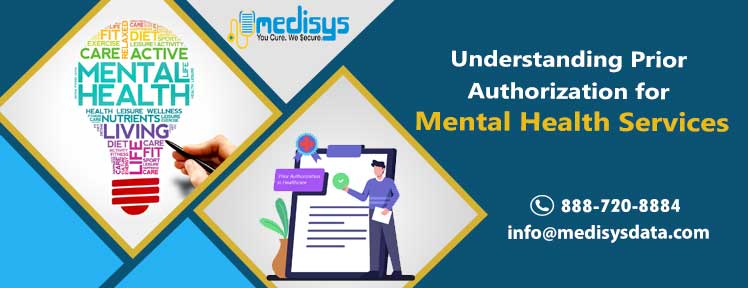Introduction
In the complex landscape of healthcare, prior authorization for mental health services has become a crucial yet often time consuming process. As mental health providers, understanding this requirement is essential to ensuring seamless patient care and optimal reimbursement. This article aims to discuss the process of prior authorization for mental health services, providing you with practical insights and actionable tips to navigate it efficiently.
What is Prior Authorization?
Prior authorization is a cost-control process used by insurance companies to determine if a prescribed treatment, medication, or service is medically necessary. This step is especially pertinent for mental health services, which can include therapy sessions, psychiatric evaluations, and certain medications. Insurance companies require this process to manage costs and ensure that the proposed care aligns with clinical guidelines.
Why is Prior Authorization for Mental Health Services Important?
For mental health providers, prior authorization serves multiple purposes:
- Ensures Medical Necessity: It validates that the treatment plan meets the clinical guidelines and is necessary for the patient’s well-being.
- Cost Management: Helps control the costs associated with mental health treatments and services.
- Improved Patient Outcomes: By ensuring appropriate and necessary treatments, patients receive more targeted and effective care.
Challenges Faced by Mental Health Providers
Navigating prior authorization for mental health services can be fraught with challenges:
- Administrative Burden: The process can be time-consuming, requiring extensive documentation and follow-ups.
- Delays in Care: Waiting for approval can delay necessary treatments, potentially impacting patient outcomes.
- Denials and Appeals: Providers often face denials, requiring a robust understanding of appeal processes to overturn them.
Steps to Streamline the Prior Authorization Process
To manage prior authorization for mental health services effectively, consider the following detailed steps:
1. Stay Updated with Insurance Policies:
Regularly review and stay informed about the latest insurance policies and guidelines related to mental health services. Subscribing to insurance newsletters and attending relevant webinars can be beneficial.
2. Accurate and Comprehensive Documentation:
Prepare detailed documentation for each patient, including:
- Initial Assessment Reports: Comprehensive reports detailing the patient’s initial assessment, diagnosis, and clinical justification for the proposed treatment.
- Treatment Plans: Clearly outlined treatment plans specifying the type, frequency, and duration of services.
- Progress Notes: Regular progress notes that document the patient’s response to treatment and any adjustments made.
3. Efficient Workflow Management:
Implement a streamlined workflow to handle prior authorizations:
- Dedicated Staff: Assign specific staff members or teams to manage prior authorizations, ensuring they are well-trained and knowledgeable about the process.
- Technology Solutions: Utilize electronic health records (EHR) systems and prior authorization software to automate parts of the process, reduce errors, and track requests more efficiently.
4. Proactive Communication with Insurers:
Establish clear lines of communication with insurance companies:
- Pre-submission Checks: Before submitting a prior authorization request, check with the insurer to ensure all required information is included.
- Follow-Ups: Regularly follow up on pending requests to expedite the approval process and address any issues promptly.
5. Patient Education and Involvement:
Educate patients about the prior authorization process and involve them in the journey:
- Inform Patients: Clearly explain the steps involved, potential wait times, and any actions they need to take.
- Set Expectations: Help patients understand the potential for delays and the importance of their role in providing necessary information.
6. Handling Denials and Appeals:
Develop a robust process for managing denials and appeals:
- Understand Common Denial Reasons: Familiarize yourself with common reasons for denial and how to address them effectively.
- Prepare Strong Appeals: When appealing a denial, provide additional clinical evidence, patient history, and a detailed explanation of why the treatment is necessary.
Best Practices for Obtaining Prior Authorization
- Early Initiation: Start the prior authorization process as soon as the treatment plan is established to avoid delays.
- Comprehensive Requests: Provide detailed and comprehensive information in the initial request to minimize the need for additional documentation.
- Follow-Up: Regularly follow up with the insurance company to track the status of the authorization.
- Patient Education: Educate patients about the prior authorization process and potential wait times, setting realistic expectations.
To conclude,
Prior authorization for mental health services is a necessary yet challenging aspect of modern healthcare. By understanding the details of this process and implementing best practices, mental health providers can enhance their efficiency, reduce administrative burdens, and ultimately improve patient care. Staying informed, maintaining thorough documentation, and streamlining workflows are key strategies that can make a significant difference in managing prior authorizations effectively.
About Medisys
At Medisys, we understand the complexities involved in managing prior authorizations. Our expert billing and administrative support services are designed to help mental health providers optimize their practices and focus on delivering exceptional care. Contact us today at 888-720-8884 / info@medisysdata.com to learn how we can assist you in managing prior authorization for mental health services, ensuring your practice runs smoothly and efficiently.












